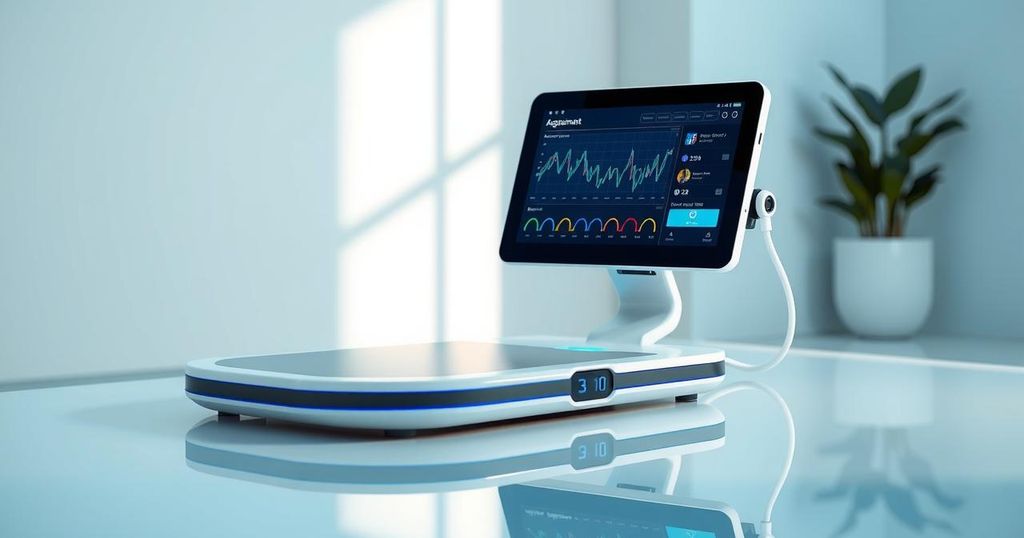Harnessing AI: A Portable Device for Early Detection of Cognitive Decline
A new study demonstrates that the MPASS device can accurately identify mild cognitive impairment in older guests by analyzing movement patterns using artificial intelligence. With an impressive 83% accuracy rate, this portable system aims to improve access to early cognitive screenings in communities lacking resources, playing a vital role in timely intervention and treatment.
A groundbreaking study in Alzheimer Disease & Associated Disorders reveals an innovative portable device that employs artificial intelligence to detect early signs of cognitive impairment in older adults. The Mizzou Point-of-care Assessment System (MPASS) utilizes a depth camera and force plate to accurately classify 83% of participants experiencing mild cognitive impairment by analyzing their everyday movement patterns. This advancement promises to enhance access to early screening in under-resourced communities where such assessments are scarce.
Mild cognitive impairment is a noticeable shift in memory and thinking skills that doesn’t significantly disrupt daily life but often acts as a precursor to more severe dementia conditions. Early detection is critical, as treatments like Lecanemab can slow disease progression if administered in the initial stages. Despite its importance, the path to an accurate diagnosis can be fraught with expense and complexity, especially in rural or underserved areas where only a small fraction of older adults receive appropriate evaluations.
To address this gap, researchers at the University of Missouri developed the MPASS, a user-friendly device for community clinics and homes. This lightweight system comprises a depth-sensing camera and a specialized force plate that measures movement patterns during various tasks such as walking and standing. This portable solution aims to democratize access to cognitive screenings, especially in settings without specialized professionals.
Study author Trent M. Guess elaborated, “Our original goal was to develop accessible technologies for assessing movement and balance for use in the clinic.” He noted how traditional gait labs, while effective, were too costly for regular clinical use outside research environments. In 2020, they aimed to adapt MPASS initially for concussion assessment and later explored its applicability for detecting mild cognitive impairment through movement analysis.
The University of Missouri’s research enlisted 47 participants aged 60 and above, where 19 had mild cognitive impairment verified through neuropsychological evaluations. Participants completed various motor tasks, some requiring dual-task challenges like counting backward while moving. This enhanced testing effectively illuminated subtle cognitive deficits through the MPASS system, which collected detailed movement data while performing these tasks.
Captured data included 27 variables encompassing stride length and weight balance, analyzed through machine learning models to classify cognitive impairment accurately. Impressively, the decision tree model achieved an 83% success rate in identifying individuals with mild cognitive impairment, demonstrating highest accuracy in balance measures when participants stood still with their eyes closed while performing mental math.
Despite some limitations, including a small sample size and a lack of demographic diversity, the results herald an opportunity for a practical, low-cost system designed for early detection of cognitive decline. With an easy-to-use design devoid of invasive tests, MPASS could be deployed in various settings to connect individuals with timely interventions, maximizing treatment efficacy.
The research team continues to refine their approach, with plans for broader studies supported by the National Institutes of Health. By enhancing the system’s complexity and accuracy in assessing cognitive and motor functions, they aim to revolutionize the screening participation among older adults, holding a beacon of hope in the fight against dementia.
In summary, the MPASS technology represents a significant breakthrough in early detection of cognitive impairment by leveraging artificial intelligence and affordable devices for movement analysis. This innovation not only promises better access to screenings but also opens up opportunities for timely interventions that can potentially alter the course of conditions like Alzheimer’s. Although the study highlights the need for future research to overcome existing limitations, the foundation laid by this research holds transformative potential for cognitive health in older adults.
Original Source: www.psypost.org




Post Comment